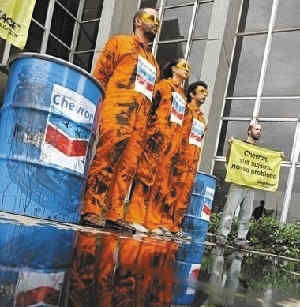
Brazil punishes oil spillers
On December 19th, the People’s Daily reported that “The Federal Prosecutor’s Office of Campos in Brazil recently demanded that Chevron Oil Company of the United States (“Chevronâ€) suspend oil drilling operations in Brazil and demand that it pay for oil spills. The compensation of 20 billion reais (about 10.7 billion U.S. dollars) will be compensated, "People's Daily said. This is Brazil's so far the largest amount of fines in oil production.
According to a recent report by Bloomberg, the Brazilian federal prosecution said in a public statement that it required a federal court to immediately stop all oil and gas operations in Chevron and oil drilling company Transocean in Brazil.
“How heavy penalties can be for excessive environmental pollution caused by oil spills?†Lin Boqiang, director of the China Energy Economic Research Center at Xiamen University, told the “International Finance†reporter yesterday. “Although the specific details of oil spill accidents may differ It is very big, but Brazil’s treatment can provide a reference for China’s handling of Conoco’s oil spill accident. Petroleum environmental pollution can be eliminated overnight, and it will take decades or even hundreds of years before it can be completely relieved.†According to the latest monitoring by the Bureau on December 18, the C platform in the Penglai 19-3 oil field in Bohai Bay is still overflowing, at least 2/min, and at most 3/min. The estimated oil spill volume is about 0.08 litres.
Businesses admit mistakes, heavy penalties in Brazil
On November 7, the staff of the Chevron offshore oil rig found that oil and gas from the seabed was overflowing from the wellhead gap, resulting in widespread pollution of the Atlantic Ocean (10.28, 0.06, 0.59%). "People's Daily" quoted the Brazilian Petroleum Administration's forecast data, said that "from November 8 to 11, there were about 2,400 barrels of oil leakage. Since then, the amount of oil leakage has gradually decreased, but the problem of oil spills has not been completely resolved."
After 10 days (Conoco China made public apologies only two months later), George Baker, CEO of Chevron Brazil, acknowledged in Rio de Janeiro that "Chevron miscalculated the pressure data and caused an oil spill accident." He publicly stated that Chevron assumes all responsibility for the accident and prevents the recurrence of similar accidents.
On December 13, Chevron acknowledged that “through the monitoring of the seabed, it was discovered that crude oil was still leaking, and there was a barrel (159 liters) a day. At the same time, it would take a while to completely stop the oil spill.†For the standard of oil spill accidents, more than 200 cubic meters (about 200,000 liters) of crude oil leaked is considered a "large area accident." Therefore, Rio State Department of Environmental Protection identified the accident as "serious."
In response, the relevant Brazilian authorities punished Chevron by 50 million reais (about 27 million U.S. dollars) at the first time after thorough and rigorous demonstration. After further investigation, the federal prosecutor's office in Campos, Brazil demanded that Chevron pay a compensation of R$ 20 billion.
In fact, the oil spill in Brazil has similarities with the oil spill of BP in April last year. On the one hand, the drilling companies that had oil spills belonged to the same company. On the other hand, Brazil and the United States promptly imposed large penalties on Chevron, a major liability company for oil spills, and BP after obtaining evidence.
ConocoPhillips hard, claim silent
In the case of heavy penalties for oil spills in the country and openly admitting mistakes, ConocoPhillips has taken a very different attitude toward the pollution incident in China. According to the “Wall Street Journal†report, “There is basically no evidence that the oil spill accident at the Penglai 19-3 oil field in Bohai Bay affected the environment in June this year.†According to the Wall Street Journal, ConocoPhillips was against Penglai 19-3. The water quality around the oilfield drilling rigs was tested and investigations were conducted along the coast.
Lin Boqiang does not agree with this. "This is just a judgment from the company's point of view. Regardless of the actual situation, at least it still requires the third-party monitoring agency and the official certification." He said that the damage caused by environmental pollution can only be underestimated, but not possible Overestimate.
Han Xiaoping, chief information officer of China Energy Network, once stated that the Bohai Sea, where the Penglai 19-3 oilfield is located, is a sea with relatively weak sea self-purification capacity because the connection between the Bohai Sea and the Pacific Ocean (6.91, 0.02, 0.29%) is only one exit of Bohai Bay, and The width of the exit is less than 100 kilometers and there are barriers between islands, large and small.
Public interest litigation lawyer Jia Fangyi repeatedly told reporters that according to his investigation, the reason why the fishermen suffered a large loss was largely due to ConocoPhillips’ oil spill. Moreover, according to the principle of evidence for pollution incidents, it is not the victim’s side that prioritizes evidence, and it is precisely the responsibility of the responsible company to provide evidence. It is understood that because of the lack of strong evidence, as of now, the relevant pollution lawsuits have not been successfully filed.
The reporter also found that ConocoPhillips' latest position is very different from the attitudes of the end of August and early September of this year. At the time, Conoco senior executives not only publicly apologized twice, but also promised to set up relevant compensation. However, the current compensation ** does not have the latest news.
Aluminum Foil,Aluminum Square Tubing ,Aluminum Panels,Aluminum Dye
Aluminum Tube & Pipe Co., Ltd. , http://www.nbaluminumplate.com